Tag: Native Title
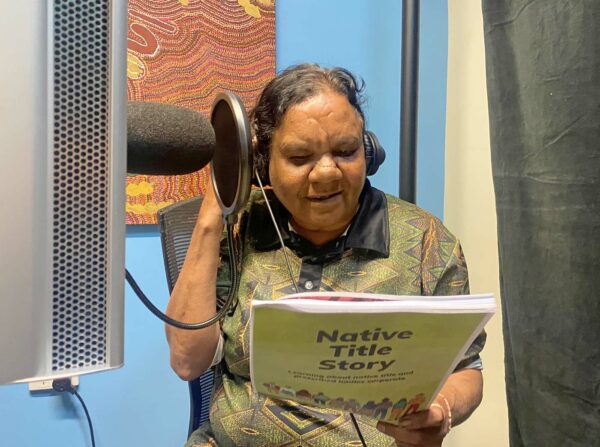
The largest gathering of native title holder corporation members in Central Australia will this week launch a new phone app in six local languages.
The Prescribed Bodies Corporate Regional Forum, better known as PBC Camp, is a biennial event aimed at strengthening the capacity of members and directors to run more than 30 corporations in the Central Land Council’s region.
Between 100 and 150 participants will today kick off the camp at the Yipirinya School in Alice Springs, where it had to be relocated due to rain.
Tomorrow morning at 10:45am CLC chief executive Les Turner will launch the multilingual PBCmob app, a new tool tackling the literacy and language barriers to understanding one of Australia’s most complex pieces of legislation, the Native Title Act.
“Knowledge is power, and the app promises to return power where it belongs – with the native title holders,” Mr Turner said.
“It will help them cut through the legalese when they negotiate about developments such as mining and horticulture on cattle stations and manage land use agreements.”
“Native title holders in remote communities have poor access to computers and the internet and often limited digital literacy, but many use mobile phones,” said Mr Turner.
“Our highly visual app is simple and easy to navigate and, most importantly, it speaks their languages.”
It explains native title concepts in Arrernte, Alyawarr, Kaytetye, Pitjantjatjara, Warlpiri and Warumungu, and compares them with land rights.
“Native title rights and land rights are very different, yet people often confuse them,” the CLC’s manager of native title, Francine McCarthy, said. “The PBCmob app aims to clear up that confusion.”
“It will also be useful for all the agencies the members and directors of native title corporations deal with, from the National Indigenous Australians Agency to Indigenous Business Australia.”
The app was funded by the Aboriginals Benefit Account and is based on the CLC’s publication Native Title Story.
Ms McCarthy is sourcing additional funding so the CLC can add more languages to the app and also make it available on PC and Mac computers.
The three-day PBC Camp program also includes an information session and discussion about the voice to parliament.
Media Contact : Elke Wiesmann | 0417 877 579| media@clc.org.au
The Central Land Council is hosting the largest gathering of directors of native title holder corporations in Central Australia this week.
The Prescribed Bodies Corporate Regional Forum at the Ross River Resort near Alice Springs, better known as PBC Camp, aims to strengthen the capacity of around 100 directors to run more than 30 corporations.
The event will kick off tomorrow with the launch and trial of six local Aboriginal language recordings of the CLC’s Native Title Story booklet.
The audio versions of the educational resource aim to overcome literacy and language barriers to understanding one of the most complex pieces of legislation in Australia, the Native Title Act.
“This is the first time something like this has been done in our region,” CLC chief executive Lesley Turner said.
“Having information in local languages on USB sticks will help native title holders when they negotiate about developments such as mining and horticulture on cattle stations and manage land use agreements,” he said.
The booklet on which the translations are based was presented at the first PBC Camp in 2019.
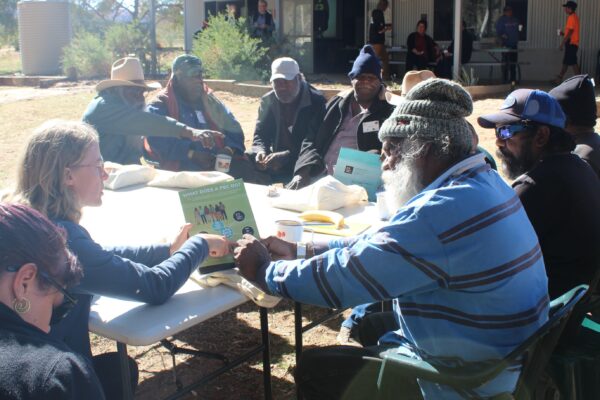
It explains key native title concepts and compares them with land rights, two very different laws people frequently confuse.
It has attracted praise around the nation and was adapted by organisations such as the Kimberley Land Council.
The CLC is seeking funding to develop a phone app with language translations to help more native title holders to find out about their legal rights and obligations in their languages.
“It’s about empowering Aboriginal people to take part in decisions about their country and cutting through the legalese,” the CLC’s manager of native title, Francine McCarthy, said.
CLC staff and consultants will be supported by staff of the National Native Title Council, the National Indigenous Australians Agency and the Office of the Registrar of Indigenous Corporations.
A prescribed body corporate is an Aboriginal corporation that manages the native title rights and interests on behalf of native title holders.
MEDIA CONTACT: Elke Wiesmann | mobile: 0417 877 579 media@clc.org.au
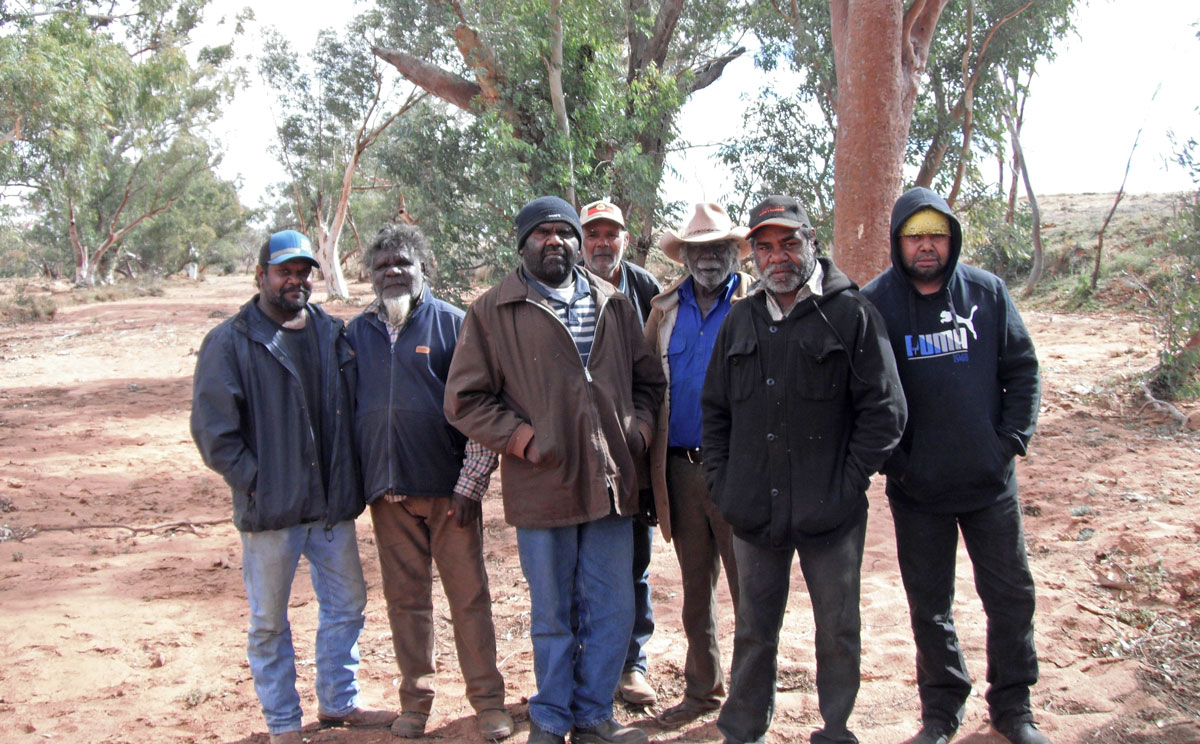
The traditional owners of the Jinka and Jervois cattle stations, 340 kilometres northeast of Alice Springs near the Queensland border, will celebrate the recognition of their native title rights tomorrow.
Justice Charlesworth will hand down a non-exclusive native title consent determination over an area of almost 5,000 square kilometres during a Federal Court sitting in the Bonya community at 11 am.
The determination area covers the two pastoral leases, a disused stock route that cuts them in half and a stock reserve, and was home to copper and silver mining from the 1920s onwards.
The stock route crosses many cultural and historical places of significance to Aboriginal people, including sacred hills which form part of the Two Eaglehawks Dreaming.
The native title holders belong to nine land holding groups and their families have worked on the stations and mines.
Native title holder Henry Oliver said the determination means he will be able to go hunting on the land like he used to with his mother.
“She was born on that country, and my stepfather was a stockman for the station,” Mr Oliver said.
The native title claim, which the Central Land Council lodged in 2018 in response to renewed mining interest on the stations, was the first claim concerning the grant of a stock route to a pastoralist that the current Northern Territory Government chose to contest in court.
The government argued that only extinguishing or regulating native title should trigger the protections of the Native Title Act, and that therefore it did not need native title holder consent before it granted the Jervois pastoral lease over the stock route in February 2017.
Its legal argument applied equally to the grant of mineral titles as it did to stock routes.
However, on the eve of the Federal Court hearing, the government withdrew its argument and the court ruled in March 2020 that the pastoral lease over the stock route is invalid.
This means the pastoralist cannot interfere with any legal activities the native title holders undertake on the 60 kilometre-long stock route.
“The court ruled in the native title holders’ favour, but if the government had succeeded with its argument there would have been no more right to negotiate about mining on pastoral leases,” CLC chief executive Lesley Turner said.
“It goes to show that it is in the best interests of all parties for development on pastoral leases to only occur with the support and consent of native title holders.
“An Indigenous Land Use Agreement is the gold standard for any development on pastoral leases and the government should have required the pastoralist to negotiate an ILUA with the native title holders,” he said.
KGL Resources, which in 2011 acquired the Jervois Base Metal Project, a proposed open-cut copper and silver mine in the Jervois Range, negotiated an ILUA with the native title holders in 2016, two years before the CLC lodged the native title claim.
The government approved the proposed $200 million mine in January.
Francine McCarthy, the CLC’s manager of native title, said the determination recognises the rights of the native title holders from the Ankerente [Ung-GRR-een-ta], Arntinarre [Un-DEEN-are-a]]; Arraperre [ARR-a-ba-ra], Artwele [ART-tool-a], Atnwarle [AT-nwar-la], Ilparle [ILL-par-la], Immarkwe [IMM-ark-wa], Ltye [ILL-tcha] and Thipatherre [DIP-a-durra] estate groups to hunt, gather and teach and to conduct cultural activities and ceremonies in the area.
“It gives them the right to negotiate exploration and mining agreements, but unlike on Aboriginal land, they have no veto right,” she said.
The native title holders will exercise their rights through their prescribed body corporate, the Ingkekure [Ingk-A-koor,] Aboriginal Corporation, which takes its name from the Eastern Arrernte word for eagle claw.
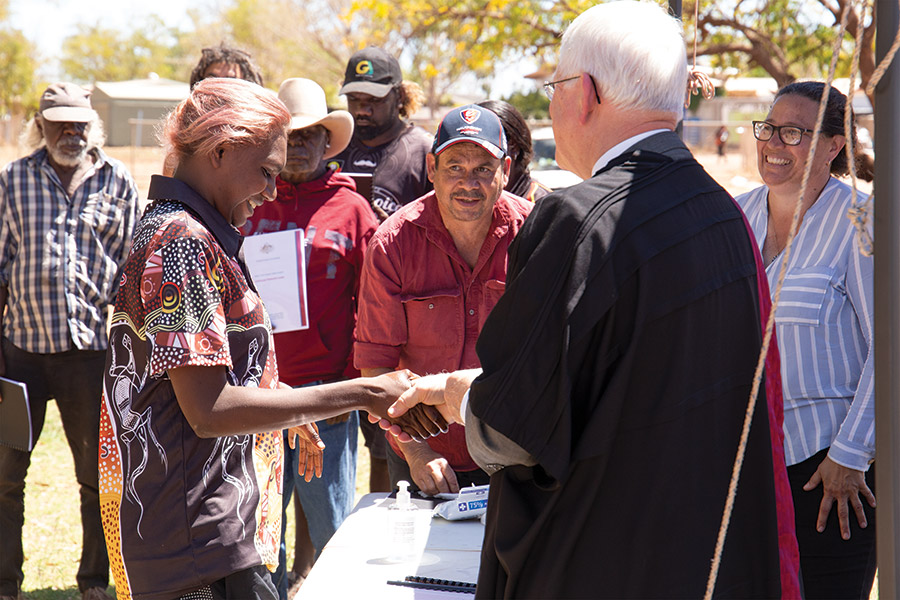
Native title holders are getting ready to celebrate the long awaited determination of native title over the childhood home of land rights leader Vincent Lingiari, Limbunya Station, on 10 September.
The Nawurlala [NA – were – la – la], Parayi-Kakaru [PA – rye KA – ka – ru], Tjutamalin [TJU – ta – ma – lin] and Central Limbunya land holding groups will gather at the Karungkarni Arts and Culture Centre in Kalkaringi at 11:30 to witness the Federal Court’s Justice White hand down the determination.
“It means that the traditional laws and customs of native title holders are recognised in Australia law, and they can use the area in accordance with them,” said the CLC’s manager of native title, Francine McCarthy.
“They will be able to access the pastoral lease land to hunt, gather, teach and perform ceremonies and to negotiate exploration and mining agreements, but unlike on Aboriginal land, they have no veto right.”
“The determination also recognises that their cultural connection to their land dates back to time immemorial.”
The 5,218 square kilometre determination area, northwest of Kalkaringi, belonged to Lord Vestey’s cattle empire and was run as part of Waterloo Station until the 1980s.
As on all Vestey’s stations, conditions were extraordinarily difficult for Aboriginal workers and their families who were paid in rations and shifted around from station to station and across state and territory borders.
However, despite these hardships, the traditional owners of this country maintained a very rich cultural life against the odds.
They kept their songlines alive as they travelled around, and as relatively distinct cultures intermingled, the Vestey stations became a crossroads of many song traditions.
It was not uncommon for station workers from the region to walk hundreds of kilometres to Limbunya during the wet season to attend ceremonies.
Quoting a custodian named Daelngari, anthropologist Catherine Berndt wrote in 1950 that the station was a major ceremonial centre in the continuation of law and customs:
“It was her contention that sacred and secular ceremonies from all the surrounding country met at this centre from the north-west coast, and Ord River; from Tanami and the Granites north through Inverway; from Newcastle Waters and the main north road, through Mudbara [sic] territory and Wave Hill; from the mouth of the Victoria and Timber Creek, through Waterloo, and through Victoria River Downs; and from Darwin and Katherine down through Willaroo.”
After Mr Lingiari led striking Aboriginal workers off Wave Hill Station in 1966, families working on Limbunya and other Vestey-owned stations also walked-off.
Many of their families today live in Kalkaringi and Daguragu and native holders continue to access their country for cultural and ceremonial purposes.
The CLC lodged the native title application in January 2017, following the successful native title claim over Kalkaringi, in part because there is mining interest in the pastoral lease area.
The native title holders will exercise their rights through their prescribed body corporate, the Malapa Aboriginal Corporation, while Limbunya Station will continue to operate as a cattle station.
The families of striking Wave Hill Station workers will celebrate the recognition of their native title rights at Jinbarak, the old homestead of the famous pastoral property tomorrow.
The station near Kalkaringi was the site of the 1966 Wave Hill Walk Off, the strike led by Gurindji stockmen Vincent Lingiari, Billy Bunter and others that marks the beginning of the land rights movement.
Justice White will hand down a non-exclusive native title consent determination over an area of approximately 5,492 square kilometres during a Federal Court sitting at Jinbarak at 11:30 am.
Many of the older native title holders from the Jamangku [ja – MUN – ku], Japuwuny [ja – PU – wun], Parlakuna-Palkinykarni [parla – KU – na PAL – kin – karni] and Yilyilyimawu [il-yi-yi-MA-wu] land holding groups and their families worked on Wave Hill Station, formerly part of the Vestey cattle empire.
“I was born on Wave Hill Station. It means everything to me and my family,” said native title holder Pauline Ryan.
“I was in the walk off in 1966. I remember that day. My stepfather, mother and grandpa were there too.”
“My uncle and grandpa and grandma passed away here. We bring our young kids here to talk about their memory. I was working here when I was 10 or 11. I was a cleaner. I never went to school.”
The station workers were exploited and shifted around from station to station and across state and territory borders but maintained a strong history of songlines, and connection to their traditional lands.
The composition of new songs is a living cultural tradition, and the native title holders share law and customs, as well as the Gurindji, Mudburra and Warlpiri languages.
Francine McCarthy, the CLC’s manager of native title, said the determination recognises their rights to hunt, gather and teach on the land and waters and to conduct cultural activities and ceremonies.
“It gives them the right to negotiate exploration and mining agreements, but unlike on Aboriginal land, they have no veto right,” she said.
Native title holder Matthew Algy said he and his family were happy about the determination.
“It’s important to the legacy of the old people who worked here. I’m carrying on in my father’s footsteps, he was a stockman and I am a stockman. I was born on New Wave Hill Station, I’ve worked here [Wave Hill Station] like my father did.”
The CLC lodged the native title application in November 2016, in response to mining interests in the pastoral lease area.
The native title holders will exercise their rights through their prescribed body corporate, the Jinparrak Aboriginal Corporation, while Wave Hill Station will continue to operate as a cattle station.
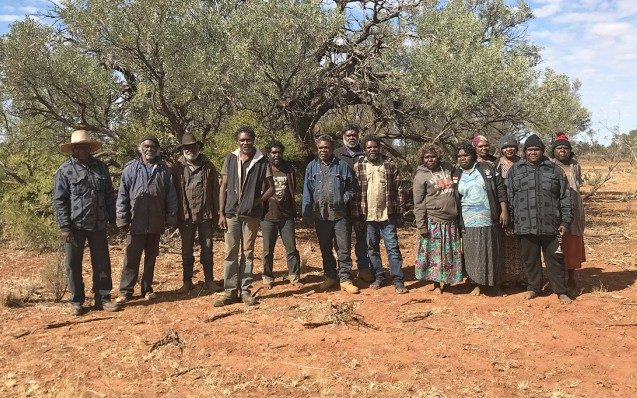
Alyawarr [pronounced Al-YA-war] speakers from the Aherrenge [pronounced AH-run-ga] land holding group will join the Minister for Indigenous Australians, Ken Wyatt, to celebrate the handback of pastoral lease land in the Northern Territory’s Sandover region.
During a ceremony at Ampilatwatja, 325 kilometres north east of Alice Springs, Mr Wyatt will return approximately 31 square kilometres of station land adjoining the Aherrenge Aboriginal Land Trust to its traditional owners.
During the ceremony at 10 am on Wednesday, 6 November, traditional owners plan to dance to celebrate the handback.
Speaking on their behalf, traditional owner Tony Morton said: “We are really happy for Minister Wyatt to hand our land back to us.”
The handback will complete a native title claim settlement from 2014.
Five years ago, the native title holders agreed not to pursue exclusive possession native title rights over a number of former stock routes and a former stock reserve that run through the pastoral lease.
Instead, they allowed to add those areas to the lease.
In exchange, the pastoralist and the Northern Territory agreed to support adding an area of station land adjacent to Ampilatwatja to the land trust area.
The Central Land Council negotiated for the block to be excised from the station and scheduled as inalienable freehold title under the Aboriginal Land Rights Act.
“That the native title holders agreed to the land swap demonstrates that Aboriginal and pastoralist interests can align in mutually beneficial ways,” said CLC CEO Joe Martin-Jard.
The 2014 native title determination incorporated the Ammaroo, Derry Downs, Murray Downs and Elkedra stations.
The native title application was filed in 2001, in response to traditional owners’ concerns over future mining and horticultural development on their land.
They wanted to ensure they would be able to continue to protect their sacred sites and to be consulted about exploration and development on their country.
The Kaytetye Alyawarr Awenyerraperte Ingkerr-wenh Aboriginal Corporation [pronounced KAY-ditch Al-YA-war AWEN-yir-apur-ta In-GER-wen] Aboriginal Corporation is the native title body corporate that exercises these rights and interests on behalf of its members.
MEDIA CONTACT: Elke Wiesmann | 0417 877 579| media@clc.org.au
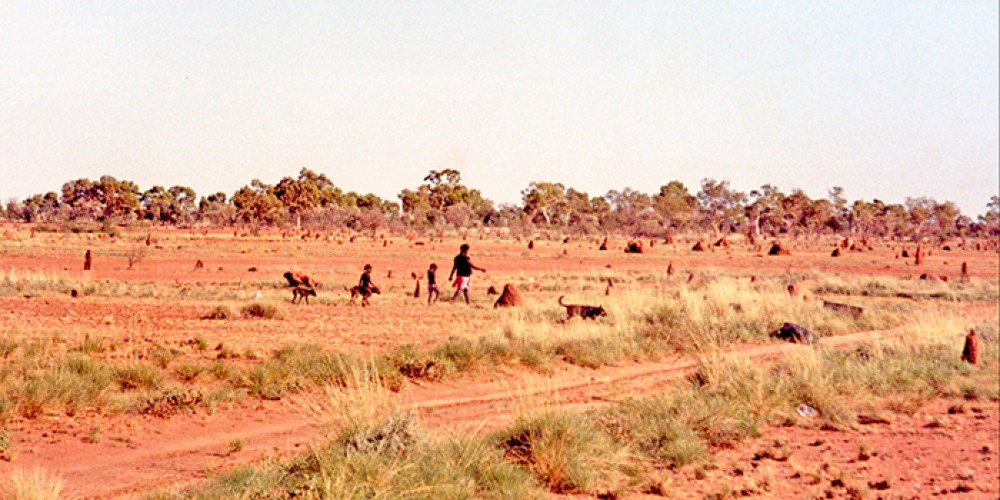
Traditional owners of Tennant Creek Station will celebrate the recognition of their native title rights on the pastoral property.
Justice Charlesworth will hand down a non-exclusive native title consent determination over an area of approximately 3650 square kilometres to seven landholding groups, during a Federal Court sitting near Lirripi (LIRR-ipi), on the cattle station some 36 kilometres south of Tennant Creek, on Thursday 4 July at 10:30 am.
The seven land holding groups with traditional attachment to the claim area are Kankawarla (GAN-ga-war-la), Kanturrpa (GAN-tur-pa), Kurtinja (KUR –tin-ja), Patta (BA-ta), Pirttangu (BIR-tang-oo), Purrurtu (BUR-rur-doo) and Warupunju (WAR-u-pun-ju).
“Native Title gives us a say over what is happening on our country and to protect our sacred sites and dreamings. If mining or gas companies want to come onto our country, they have to sit down with us and negotiate,” said native title holder Jerry Kelly.
“The determination recognises the rights of the native title holders to hunt and gather on the land and waters and to conduct cultural activities and ceremonies,” said Francine McCarthy, the CLC’s manager of native title.
“It gives them the right to negotiate exploration and mining agreements, but unlike on Aboriginal land, they have no veto right.”
Ms McCarthy is also one of the native title holders of Tennant Creek Station.
“We can go onto country to teach our younger generations about sacred sites and dreamings, and work with the station owner to protect our waterholes, with the help of the Tennant Creek Rangers,” said Gladys Brown, native title holder.
The CLC lodged the native title application in October 2017, following mining and other development interests within Tennant Creek pastoral lease.
Tennant Creek pastoral lease, which will continue to operate as a cattle station, is home to many cultural and historical places of significance to Aboriginal people.
“Their elders and ancestors were born, lived and worked on Tennant Creek Station since the early 1900s,” said Francine McCarthy.
Like Phillip Creek Station to the north, native title holders were unsuccessful in purchasing the station in the early 2000s when it was placed on the market.
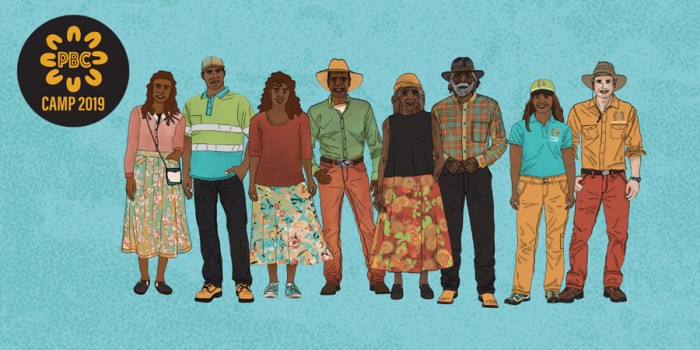
Native title holders of Central Australia will gather at the Ross River resort for the inaugural Prescribed Body Corporate Regional Forum, on 18-21 June 2019.
The week-long event will support around 140 directors from the 29 PBCs from the Central Land Council region to share their stories, develop their knowledge and skills, and obtain a greater understanding of the opportunities native title can provide.
“This unprecedented event has been tailored to the unique needs and circumstances of remote native title holders,” said the CLC’s manager of native title, Francine McCarthy.
“It will give PBC directors an opportunity to network, learn more about PBCs, and have a stronger voice for their country.”
The Central Land Council, the National Native Title Council and the Department of Prime Minister and Cabinet have been working closely to bring the forum to Central Australia.
“It will be a unique event to deliver valuable information to PBC Directors about the range of funding and support available across Government and assist in organisational development,” said Jamie Lowe, acting CEO of the National Native Title Council.
A prescribed body corporate is a corporation required to be nominated by a group of Aboriginal or Torres Strait Islander peoples to hold and manage their native title rights and interests when that group has succeeded in having their native title recognised in a Federal Court determination.
“I am excited to learn about the roles of PBCs and to get a better understanding of how PBCs work,” said Nikkita Crafter, member of the Patta Aboriginal Corporation.
The CLC will take this opportunity to introduce the recently established PBC Support Unit and gain invaluable feedback from PBC Directors on issues and challenges encountered.
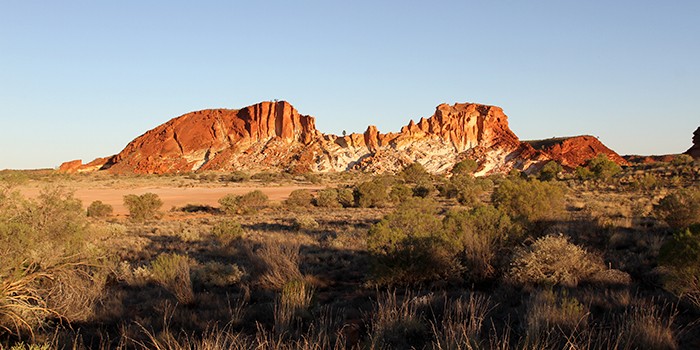
Native title holders from the Imarnte [Ee-MAN-ta] land holding group are getting ready to celebrate the long awaited determination of native title over the Rainbow Valley Conservation Reserve they call Wurre [WOOR-rah].
The families will be gathering at the Rainbow Valley ranger station on Tuesday, 7 May at 3.30pm, to hear Justice Reeves hand down a non-exclusive consent determination over an area of approximately 25 square kilometres.
The reserve, an hour’s drive south of Alice Springs, contains important sacred sites and is of great cultural significance to native title holders from the Southern Arrernte language group, many of whom live on nearby outstations.
“Rainbow Valley has always been our country, handed down from grandfather to grandfather,” said native title holder Eric Braedon.
“It was a big ceremony place for all Imarnte people from all different areas of Imarnte country. All came in to do ceremony until the white man came and moved us to Maryvale Station,” Mr Braedon said.
The determination area has been jointly managed by the native title holders and the NT Parks & Wildlife Commission (PWC) since 2005.
The native title holders have worked alongside PWC rangers to manage the reserve for visitors and to protect its cultural and natural values, for example through weed and fire management and building tracks.
When the Central Land Council negotiated the joint management arrangement with the Northern Territory the government agreed to consent to a native title claim over the area.
However, it did not agree to the lodgement of the claim until June 2018.
“The determination means that native title holders can use the area in accordance with their traditional laws and customs,” said the CLC’s manager of native title, Francine McCarthy.
“It recognises that their cultural connection to Wurre dates back to time immemorial, and acknowledges how much the area means to them.”
“Their native title rights will co-exist with the use of Wurre as a conservation reserve,” Ms McCarthy said.
Native title holder Ricky Orr has conducted cultural tours to his country since 2008.
“The area is a very important meeting place for visiting in the good times when food and water are plentiful and, most significantly, as a men’s ceremonial ground,” Mr Orr said.
The native title holders will exercise their rights through their prescribed body corporate, the Wura Aboriginal Corporation.
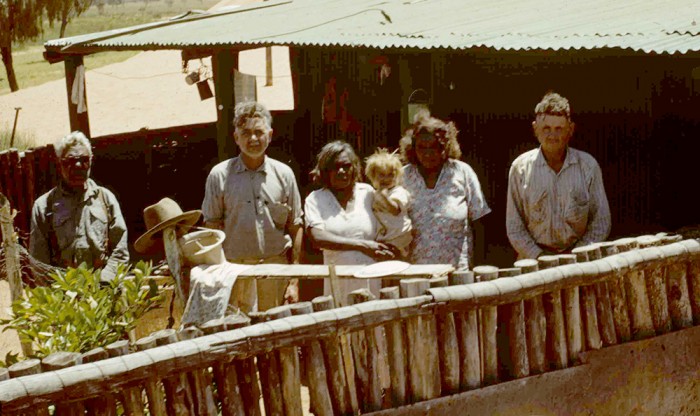
Traditional owners of Henbury Station, south of Alice Springs, will celebrate the recognition of their native title rights on a pastoral property that they have long wanted to buy.
Justice John Reeves will hand down a non-exclusive native title consent determination over an area of more than 5000 square kilometres to six land holding groups during a Federal Court sitting at Three Mile waterhole on Henbury tomorrow at 11am.
“We been fighting for a long time for the station,” said native title holder and former Central Land Council chair, Bruce Breaden. “I’ve been pushing really hard all the time to get country back, not only for my family but for all Aboriginal people.”
“The determination recognises the rights of the native title holders to hunt and gather on the land and waters and to conduct cultural activities and ceremonies,” said Francine McCarthy, the CLC’s manager of native title.
“It gives them the right to negotiate exploration and mining agreements, but unlike on Aboriginal land, they have no veto right.”
Mr Breaden said the process of applying for native title has still been worthwhile.
“We know native title is not strong like land rights, but it gives us a chance to have a say. We have sacred sites all over Henbury. Native title research was a chance to look around country and show the younger ones.
The native title holders belong to the Inteyere [IN-dia-ra], Twenge [TU-nga], Ipmengkere [IB-ma-nga-ra], Murtikutjara [MU-ti-kut-ja-ra], Aniltika [AN-il-ti-ka] and Nthyareye [‘DA-rie] groups.
Some of the old people still speak Pertame [PUR-dum], an endangered language they are working to revive, while some speak Western Arrernte [A-ran-da] and Matuntara Luritja [MA-toon-da-ra LOU-ri-tja].
Their elders and ancestors were born, lived and worked on Henbury Station since the late 1800s and many are buried there.
They have fought unsuccessfully for more than 40 years for the return of their country.
Following an Australian Government assisted purchase in 2011 the lease transferred to the RM Williams Agricultural Holdings for the purpose of carbon farming.
The CLC helped the traditional owners to negotiate with the company for a staged return of the land and to source funding for a dedicated Aboriginal ranger group to manage the land.
However, when RM Williams was placed in receivership in June 2013 the traditional owners, in collaboration with the Indigenous Land Corporation, submitted expressions of interest to purchase the property.
Their plans were dealt a bitter blow when Henbury was sold to Ashley and Neville Anderson, Ted and Sheri Fogarty and David Rohan, a consortium of established Central Australian pastoral interests.
“The Indigenous Land and Sea Corporation (ILSC) was helping but we didn’t have enough money. We will push it again next time. Working on country is good for Aboriginal people,” said Mr Breaden.
The CLC lodged the native title application in 2016.
Henbury, which will continue to operate as a cattle station, is home to the world’s oldest river, the Finke (Lhere Pirnte, pronounced LA-ra PIN-ta) and meteorite craters (Tatyeye Kepmwere, pronounced TAT-ja KA-pa-ra).
The determination area surrounds several outstations on Aboriginal land that are connected by an old stock route.
The Twenge [TU-nga] Aboriginal Corporation will hold the native title rights and interests for the determination area.
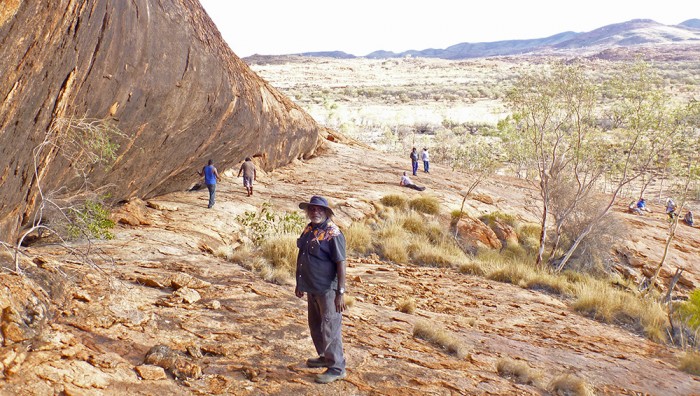
Native title holders are celebrating the recognition of their rights on the western side of Pine Hill Station, north of Alice Springs.
Five Anmatyerr-speaking land holding groups will join Justice John Reeves tomorrow at Arden’s Soak Bore on Pine Hill Station at 11 am for a special sitting of the Federal Court, as he hands down a consent determination over an area of more than 1500 square kilometres.
The determination complements an earlier native title declaration over the east of the pastoral lease.
Many native title holders from the Alherramp [AL-er-ramp], Arempey [ERR-am-pie], Lyelyepwenty [LEEL-a-punge], Ngwenyenp [NGOON-ya-pa] and Tywerl [CHU-la] groups grew up and worked on the station.
“I worked for a long time on Pine Hill. I branded bullocks and broke horses,” said Leslie Stafford Pwerrerl.
Peter Cole Peltharr said old people told them “the right stories”.
“Old Bruce Campbell, he was a cook who told us stories about country and I now pass on those stories to young people,” Mr Cole said.
The native title holders hunt, visit rock holes and practice ceremony on the station, often in the company of the Central Land Council’s Anmatyerr rangers in Ti Tree.
“We feel good when we go to country,” said Amy Campbell Peltharr.
“When the CLC rangers come to help us we go to places we did not go to for a long time.”
“I teach young people about important places and to do ceremony the right way,” Mr Stafford said.
“I sometimes go to Pine Hill and take young girls to show them how to get bush tucker and medicine,” Daisy Campbell Peltharr added.
“I like to camp out at Pine Hill and look for bean tree seeds with my younger sister.”
Francine McCarthy, the CLC’s manager of native title, said the determination recognises these rights under Australian law.
“It also gives the native title holders the right to negotiate about mining and exploration proposals, but not to veto them,” Ms McCarthy said.
She said some of the native title holders want to return to Anyungyunba [AN- oon-ung-un-pa] outstation, across the river from the Pine Hill homestead.
“From tomorrow, native title will be recognised over the whole station,” she said.
“The determination for the eastern side of Pine Hill was made in August 2009 and a small portion was included in the Nolan Bore native title determination in 2017.”
That application was filed in response to plans of the Pine Hill Pastoral Company to grow grapes on the property.
The NT government bought the lease in 2000 to secure horticultural development over the Ti Tree Basin and the lease was then sold back to the pastoralist in 2008.
The CLC filed the Pine Hill (west) application in September 2016.
The applicants’ prescribed body corporate, the Pine Hill West Aboriginal Corporation, will hold the native title rights.
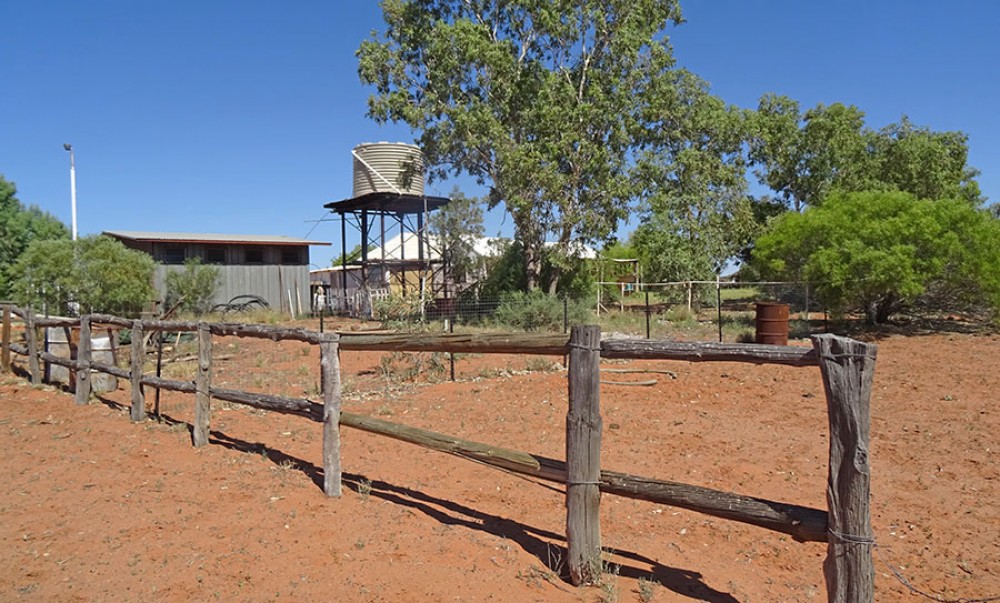
Native title holders of two pastoral properties in the south of the Northern Territory will celebrate a native title consent determination at a special sitting of the Federal Court this week.
Justice Charlesworth will hand down a non-exclusive native title consent determination over the Andado and New Crown stations, an area of almost 20,000 square kilometres, on Thursday 24 May.
The Southern and Eastern Arrernte native title holders will celebrate the determination 10.30 am with a ceremony in the community of Aputula (Finke).
Artist and native title holder Marlene Doolan, who has lived at Aputula most of her life, will present the Central Land Council with a painting depicting connection to country, dreamings and bush foods.
“I learnt my knowledge from the old ladies who passed it down to me,” Ms Doola
n said.“My job is to teach the younger generations today to keep the culture strong.”
The native title holders belong to four family groups connected to country in the determination area: Andado, Pmere Ulperre [MUR ra OOL pura], New Crown and Therreyererte [THER errta].
Their families lived and worked on the stations from the 1890s until the 1970s and have proved that they have a continuing connection with their country.
Francine McCarthy, the Central Land Council’s manager of native title, said the determi
nation recognises native title rights, such as the rights to hunt and gather on the land and waters and to conduct cultural activities and ceremonies, as well as the right to negotiate agreements about exploration and mining.
“Both stations are subject to minerals authorities held by Tri-Star,” Ms McCarthy said.
Native title holders instructed the CLC to negotiate an agreement with the company, in response to its oil and gas exploration activities in the region, as well as proposed minerals exploration.
The CLC lodged the native title claim in 2013.
In 2016, only days before the Northern Territory election, the mines department announced it would grant the company mineral authorities for the purpose of coal exploration which would lower Tri Star’s exploration costs and improve its security of tenure.
The CLC lost an appeal against the expedited procedure in the National Native Title Tribunal and the current NT government granted the minerals authority in November 2017.
The company can start exploration without an agreement with the native title holders.
“Native title holders are trying to negotiate an agreement with the company but, unlike land rights, native title does not give them the right to veto exploration or mining,” Ms McCarthy said.
If exploration was successful and the company wanted to develop a mine it would have to apply for a mineral lease.
The Andado and New Crown leaseholders will continue to run the properties as cattle stations while the Tyatykwenhe [DUD ja corner] Aboriginal Corporation will hold the native title rights and interests for the determination area.
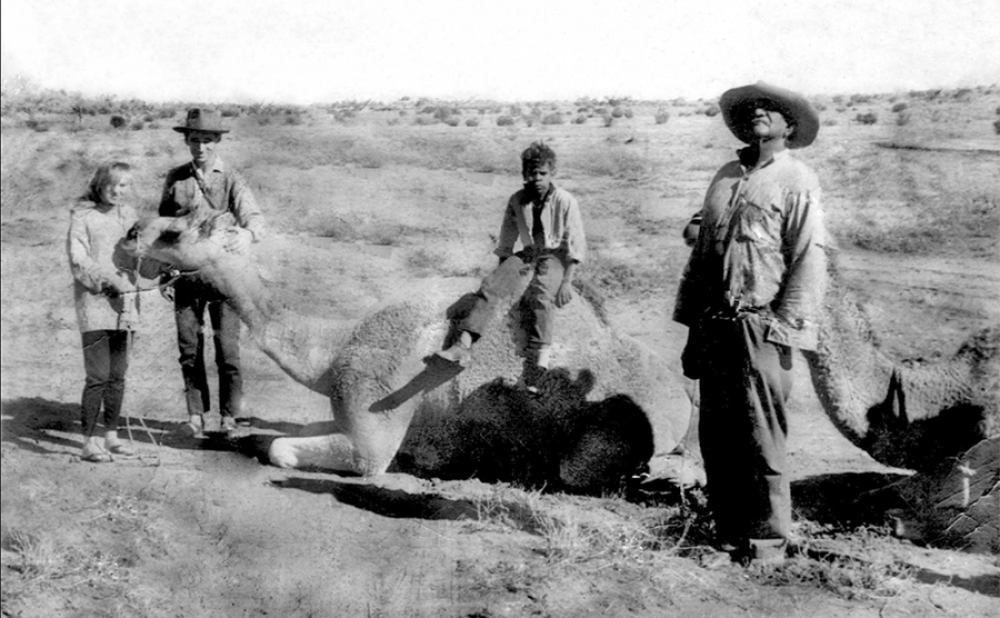
When native title holders celebrate the native title determination over the Maryvale cattle station south of Alice Springs tomorrow, they will remember their families who lived and worked there for 80 years.
At a special sitting of the Federal Court on Maryvale, Justice Charlesworth will hand down a consent determination over an area of 3,244 square kilometres.
The ceremony will take place on the banks of the Hugh River, 3.6km from the community of Titjikala, south of Alice Springs on 23 May at 11 am.
The native title holders’ from the Imarnte, Titjikala and Idracowra land holding groups speak Southern Arrernte, also known as Pertame [PUR-dum], and many of them live in Titjikala, an community living area excised from the pastoral lease and not included in the claim.
The native title holders will be celebrating the recognition of their right to hunt and gather on the station, to protect their sacred sites and conduct cultural activities and ceremonies.
“This determination will also give them the right to negotiate about exploration and mining activities on their land, for example the salt mine and hazardous waste storage facility in the determination area,” said Francine McCarthy, the Central Land Council’s manager of native title.
The native title holders are currently negotiating an agreement with the operator, Tellus.
The European history of the determination area dates back to the 1890s, when pastoralists established what was then called Mount Burrell station.
“The area includes a site where, in the 1860s, the party of explorer John McDouall Stuart shot at three armed Aboriginal men who allegedly threatened the expedition,” Ms McCarthy said.
“TGH Strehlow and other anthropologists recorded frequent violence between the Mount Burrell pastoralists and the Aboriginal land owners who resented their intrusion and kidnapping of local women.”
The Rodinga Aboriginal Corporation will hold the native title rights and interests for the determination area while Maryvale Station will continue to operate as a cattle station.

A native title determination over Phillip Creek Station in the Northern Territory will trigger memories for many Warumungu and Warlmanpa language speakers this week.
On Thursday, 3 August, Justice Mortimer will hand down a consent determination over an area of approximately 3,800 square kilometres during a special sitting of the Federal Court on the cattle station 55 kilometres north of Tennant Creek.
“Some of us worked or grew up on Phillip Creek Station, or our families told stories of what life was like working and living on the station in the early days,” said Norman Frank, one of the native title holders.
“As a young man, my father worked there, doing station work and looking after country,” Mr Frank said.
The nine landholding groups with traditional attachment to the claim area are the Kankawarla [GAN-ga-war-la], Jajjinyarra [DJA-djin-ar-ra], Patta [BA-ta], Pirrtangu [BIR-tang-oo], Purrurtu [BUR-rur-doo], Wapurru [WA-bur-roo], Yurtuminyi [JOOR-tu-mi-nee], Kanturrpa [GAN-tur-pa] and Linga [LIN-ga] groups.
The native title holders will travel from across the Territory to start the ceremony at 10.30am at Purrumpuru [BOOM-bu-roo] Waterhole, one of a number of significant waterholes in the claim area.
One of them is the manager of the Central Land Council’s native title unit, Francine McCarthy.
“The determination recognises our rights to hunt and gather on the land and waters and to conduct cultural activities and ceremonies,” said Ms McCarthy.
“It will also give us the right to negotiate about exploration, mining and tourism activities on our land while the lessee will continue to operate the lease as a cattle station,” she said.
A good relationship with the pastoral lessee has enabled the native title holders to continue to visit their country and look after it.
Between 1995 and 1998, the CLC negotiated approval for three community living areas on the station for native title holders and their families.
These excisions are not part of the native title determination area.
When Phillip Creek Station was placed on the market, in the early 2000s, the native title holders were not successful in purchasing it.
Yangkunytjatjara and Matutjara language speakers will tomorrow celebrate the first native title determination in the south of the Northern Territory.
At a special sitting of the Federal Court, Justice Reeves will hand down a consent determination over an area of approximately 12,500 square kilometres at the border with South Australia.
The area, which includes some of the region’s most spectacular landscapes, comprises the pastoral leases of Victory Downs, Mt Cavenagh, Mulga Park and Umbeara.
They will continue to operate as cattle stations.
The native title holders are associated with significant places such as Ananta (Umbeara), Kalka (Old Kulgera Station, now part of Umbeara), Watju (Mt Cavenagh), Wapirrka (Victory Downs) and Warnkula (Mulga Park).
They are travelling from South Australia, Western Australia and the Territory to the ceremony at Victory Downs, which starts at 10:30 AM on Thursday, 4 May.
Central Land Council chair Francis Kelly is joining them for the celebrations.
“I am very happy for the families and look forward to congratulating them all,” Mr Kelly said.
He said the determinations recognise the rights to hunt and gather on the land and waters and to conduct cultural activities and ceremonies.
“It will also give the native title holders the right to negotiate about exploration, mining and tourism activities on their land,” he said.
The claim area was the first native title application the CLC lodged in the south of its region and is the second-largest area in its region to have native tile recognised.
2017 is shaping up to be a big year in native title for the CLC, with three consent determinations handed down in April and another two expected before the end of the year.
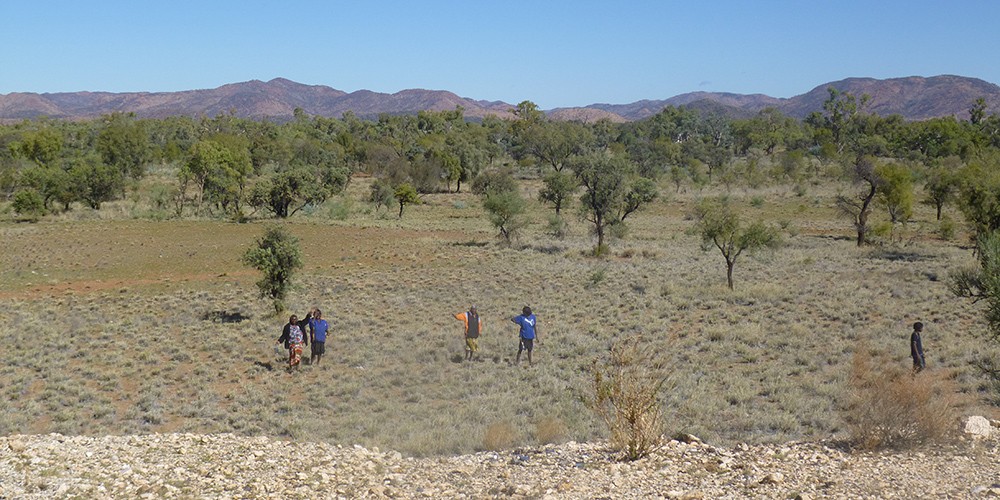
Native title holders of two pastoral properties and an area including a mineral lease north of Alice Springs will celebrate native title consent determinations at special sittings of the Federal Court.
Justice Griffiths will hand down two non-exclusive native title consent determinations on Aileron Station on 5 April and one at the Harts Range Racecourse on 6 April.
At the sitting at Harts Range Racecourse he will hand down a determination of native title over the whole of Mt Riddock Station, an area of approximately 2,700 square kilometres.
The determinations of native title over the Aileron Perpetual Pastoral Lease (PPL) and the area including the mineral lease known as Nolan Bore will be held at Pretty Camp Dam on Aileron Station.
They relate to an area of approximately 4,210 square kilometres.
Central Land Council chair Francis Kelly said the determinations recognise native title rights, such as the rights to hunt and gather on the land and waters and to conduct cultural activities and ceremonies.
“It will also give the native title holders the right to negotiate about exploration and mining activities,” Mr Kelly said.
The native title determinations will also recognise their rights to negotiate about exploration and mining activities on their land.
These rights will co-exist with those of the Mt Riddock and Aileron lease holders, who will continue to run the properties as cattle stations.
The Aileron native title holders are of the Alhankerr [al-HUNG-kera], Atwel/Alkwepetye [a-TOOL-a/al-KOOP-pitch], Ilkewarn [ill-ka-WART-na], Kwaty [quot-JA], Mpweringke [m-PURR-ring-ka], Ntyerlkem/Urapentye [n-JERL-kema/yuara-pen-JA] and Tywerl [JEW-la] land holding groups
Nolan Bore native title holders belong to the Kwaty [quot-JA] and Tywerl [JEW-la] land holding groups, while the Mt Riddock native title holders belong to the Atwele [a-TOOL-a], IIrrelerre [ira-LEER-ra], Ulpmerre [UPL-mer-ra] and Wartharre [WARA-tara] land holding groups.
The Irretyepwenty Ywentent Pwert [air-rich-a-PUNJ yun-TINT a-PUTA] Aboriginal Corporation will hold the native title rights and interests for Aileron PPL while the Kwaty [quot-JA] Aboriginal Corporation holding will hold the native title rights and interests for Nolan Bore.
The Tywele [JEW-la] Aboriginal Corporation will hold the native title rights and interests for Mt Riddock PPL.
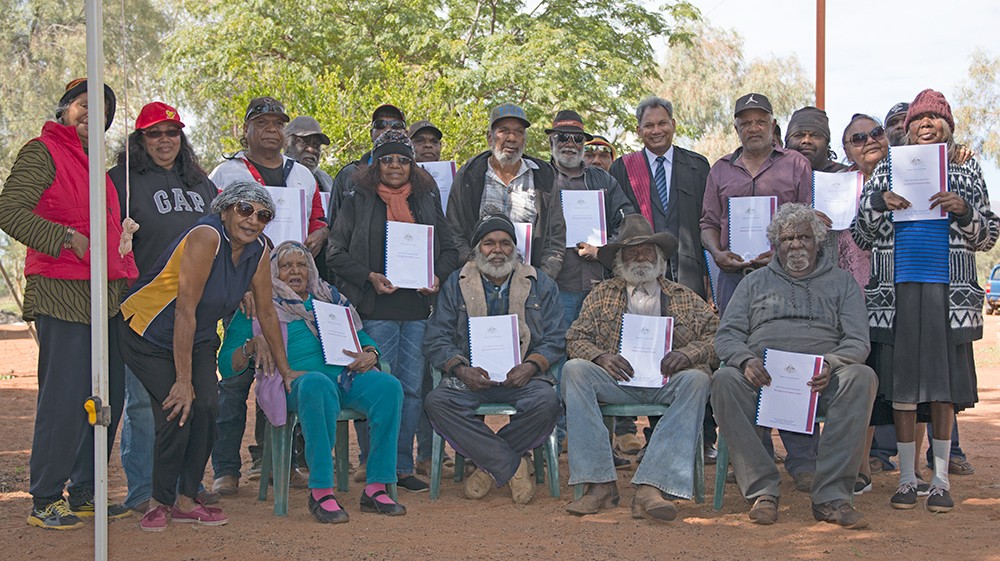
Native title holders of two pastoral properties near Alice Springs have celebrated native title consent determinations at special sittings of the Federal Court at two remote central Australian outstations.
Justice Rangiah handed down two non-exclusive native title consent determinations at Cockatoo Creek and M’Bunghara outstations last week.
At a sitting at Cockatoo Creek east of Yuendumu on 16 June he handed down a determination of native title over the whole of Mt Denison Station, more than 2,700 square kilometres.
The determination at M’Bunghara outstation, one day earlier, was in relation to an area covering the whole of Narwietooma Station, almost 2,600 square kilometres, and a portion of the Dashwood Creek where the claimants proved exclusive possession.
CLC chair Francis Kelly said he hopes the Mt Denison determination will improve the relationship between the traditional owners and the pastoral lease holders.
“It will make it easier to share the country,” he said.
Mr Kelly said the court’s determinations recognise the groups’ rights to hunt, gather and fish, as well as to conduct cultural activities and ceremonies on their land.
“It also gives them the right to negotiate about exploration and mining.”
These rights will co-exist with the Mt Denison and Narwietooma pastoral leases, which will continue to be run as cattle stations.
The Mt Denison native title holders belong to the Rrkwer [YURR-koo-roo]/Mamp [Mamp]/Arrwek [YARR-oo-koo], Yinjirrpikurlangu [Yin-JEER-pick-er-lung], Janyinpartinya [Jan-YIN-part-in-ya], Yanarilyi [Yan-yar-ILL-yee] and Ngarliyikirlangu [NAR-li-ker-lung] landholding groups.
Their native title rights and interests will be held by their Registered Native Title Body Corporate, the Mt Denison Aboriginal Corporation.
The Narwietooma native title holders are Western Arrernte and Anmatyerr [un-MAT-jara] speakers and belong to the Imperlknge [Ee-MALK-na], Urlatherrke [Ula-TER-ka], Parerrule [Pare-RU-la], Yaperlpe [Ja-PAL-pa], Urlampe [Oo-LAM-ba], Lwekerreye [Loo-KA-ria] and Ilewerr [Iloo-AA-ra] landholding groups and people who have rights and interests in the area of land known as Kwerlerrethe [KOO-lara-ta].
The Wala Aboriginal Corporation, whose members are the common law native title holders, will become the Registered Native Title Body Corporate that holds their rights and interests.
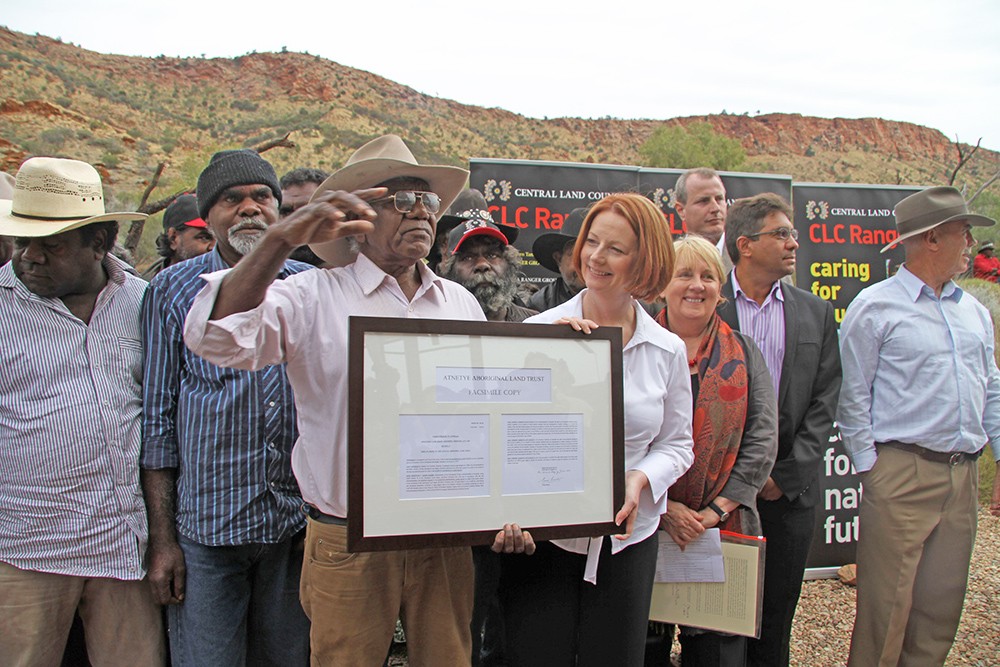
Eastern Arrernte traditional owners will receive Aboriginal freehold title to a missing piece of the vast Simpson Desert land claim on Monday, June 6.
The grant concludes one of the largest and longest running land claims in the CLC region, 36 years after it was first lodged.
The title to the 110,000 hectare area, also known as NT Portion 4208, will be granted to the Atnetye (pronounced at-NIT-cha) Aboriginal Land Trust in a handback ceremony at Keringke Arts in Santa Teresa community at 11.30 am.
Indigenous Affairs Minister Nigel Scullion and the Federal Member for Lingiari Warren Snowdon will attend the ceremony.
Many of the traditional owners of the area, from the Uleperte (pronounced oo-la-PUR-ta) and Uleralkwe (pronounced oo-la-RALK-wa) estate groups, live at Santa Teresa, Alice Springs and along the Plenty Highway.
Former Aboriginal Land Commissioner Howard Olney gave his report on the Simpson Desert Land Claim Stage IV in 2009.
Although NT Portion 4208 had not previously been recommended for grant he suggested that, given his findings of traditional ownership of the Uleperte estate and the subsequent location of an important sacred site, that the Australian government consider granting that land to the traditional owners.
It was not included in the title to 18,000 square kilometres of the Simpson Desert returned by former Prime Minister Julia Gillard in 2011.
Following representations from the CLC, Senator Scullion advised in May 2014 that NT Portion 4208 would be included in a schedule to the Aboriginal Land Rights Act and handed back to the traditional owners.
“There’s plenty of sacred sites there and we still have plenty of ceremony and pass the knowledge on,” the late former CLC chair Lindsay Bookie said during the 2011 Simpson Desert handback ceremony.
“Our culture has stayed really strong and we know all the places and all the stories and songs.”
Mr Bookie was one of the claimants who gave evidence about their cultural and spiritual links to country in hearings held in the Simpson Desert but not a traditional owner of the land to be handed back on Monday.
He said even though the Simpson Desert was remote, people were still strongly connected to their country.
“The traditional owners already look after that country but now it’s ours we can control visitors’ behaviour a bit better because they will have to have a permit.
We want them to keep our country clean and not chuck their rubbish around like some travellers have done,” Mr Bookie said.
“They’ve got to look after the country, we’ve all got to do it.”
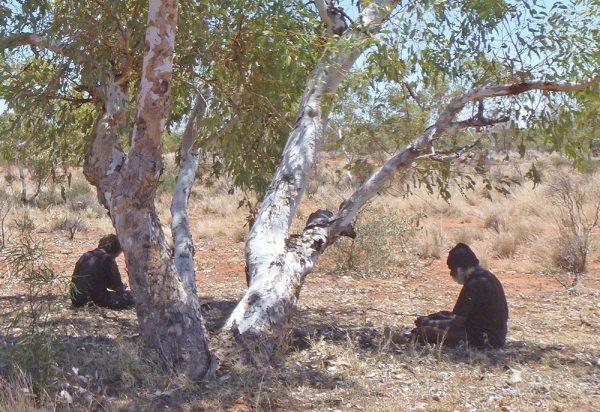
Traditional landowners of two adjoining pastoral stations north of Alice Springs will celebrate a native title consent determination tomorrow.
Justice Reeves will hand down a non-exclusive native title consent determination at a special sitting of the Federal Court on the Hanson River on Stirling Station, approximately 260 km north of Alice Springs.
The almost 15,000 square kilometre determination area covers the whole of Stirling Station and the southern and eastern portions of Neutral Junction Station.
The north-western portion of Neutral Junction Station around the Crawford Range was the subject of a previous native title determination in July 2011.
The traditional owners are Anmatyerr and Kaytetye speakers from 13 different landholding groups – Akalperre, Amakweng, Alapanp, Arlwekarr, Arlpawe, Arnerre, Arnmanapwenty, Errene/Warlekerlange, Errweltye, Kwerrkepentye, Rtwerrpe, Tyarre Tyarre and Wake.
From tomorrow, the members of these groups will hold native title rights over the determination area and govern how rights and interests in land are acquired and held within the area.
The CLC originally filed their native title application in July 2011, in response to mining exploration license applications (future acts).
“The traditional owners were concerned about the protection of sites and wanted to have a say over exploration on their country,” said CLC director David Ross.
“The court’s determination will recognise the groups’ traditional rights to hunt, gather and fish, as well as to conduct cultural activities and ceremonies on their land.
It will also secure their right to negotiate over any future acts, such as exploration and mining.”
Mr Ross said these rights will co-exist with the pastoral leases, which will continue to be run as cattle stations.
The Eynewantheyne Aboriginal Corporation will become the Registered Native Title Body Corporate that holds the native title rights and interests on behalf of its members.
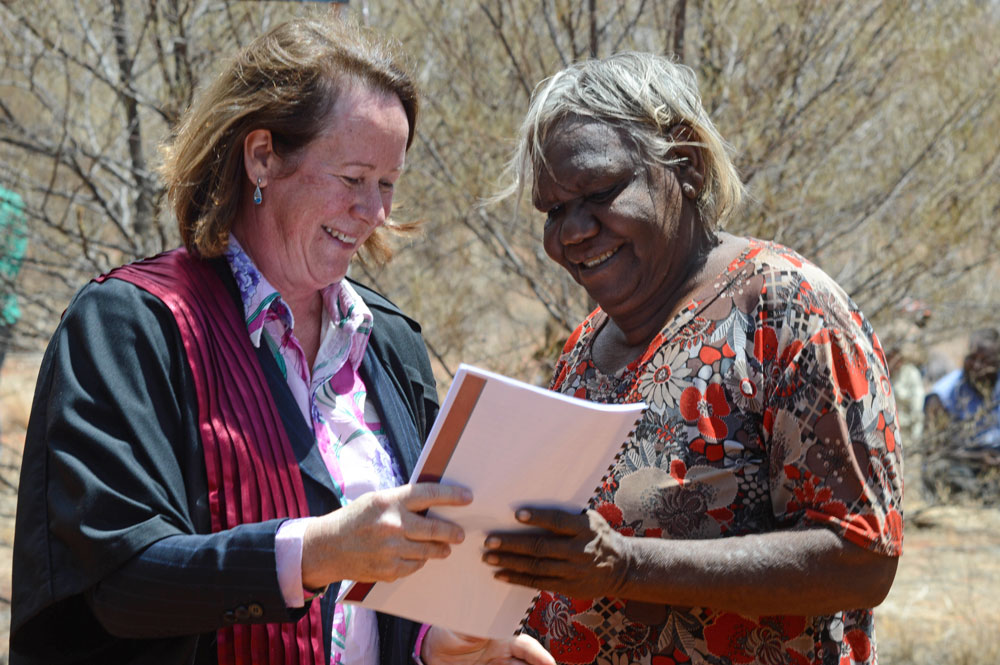
Alyawarr and Kaytetye speakers from 19 land holding groups this week won recognition of their native title rights over 18,800 square kilometers of land in the Sandover region.
The determination area incorporates Ammaroo, Derry Downs, Murray Downs and Elkedra Perpetual Pastoral Leases (PPLs).
Justice Mortimer handed down the native title determination by consent of the parties at a special sitting of the Federal Court at Honeymoon Bore, near Ampilatwatja community, approximately 325 kilometres northeast of Alice Springs.
“The groups’ right to hunt and gather, to conduct cultural activities and ceremonies and to negotiate about ‘future acts’ like mining will now co-exist with the pastoral leases and the PPLs will continue to be run as cattle stations,” explained CLC director David Ross.
CLC chair Francis Kelly and Mr Ross congratulated the native title holders and paid tribute to the claimants who have passed away during the claim process.
Mr Ross said the CLC filed the native title application 13 years ago in response to traditional owners’ concerns over future mining and horticultural development on their land.
“They wanted to ensure they would be able to continue to protect their sacred sites and to have a say over exploration and development on their traditional country.” he said.
“Our children will rise up and they will continue to stand up for their rights, as we are standing,” said Gilbert Corbett of the Atnwengerrp landholding group.
“Also, remembering our poor old people … remembering all our people – from north, east and west. I thank you all.”
The determination of non-exclusive native title rights is supported by an Indigenous Land Agreement which allows for the incorporation of the former stock routes and former stock reserve on Ammaroo PPL into the pastoral lease and compensation for the native title holders.
As part of the compensation package a small parcel of land adjoining the Aherrenge Aboriginal Land Trust will be excised from Ammaroo PPL and scheduled as Aboriginal Land under the Aboriginal Land Rights Act.
The Alyawarr Awenyerre Aperte Ingkerr-Wenh Aboriginal Corporation will become the Registered Native Title Body Corporate that holds the native title rights and interests on behalf of its members.
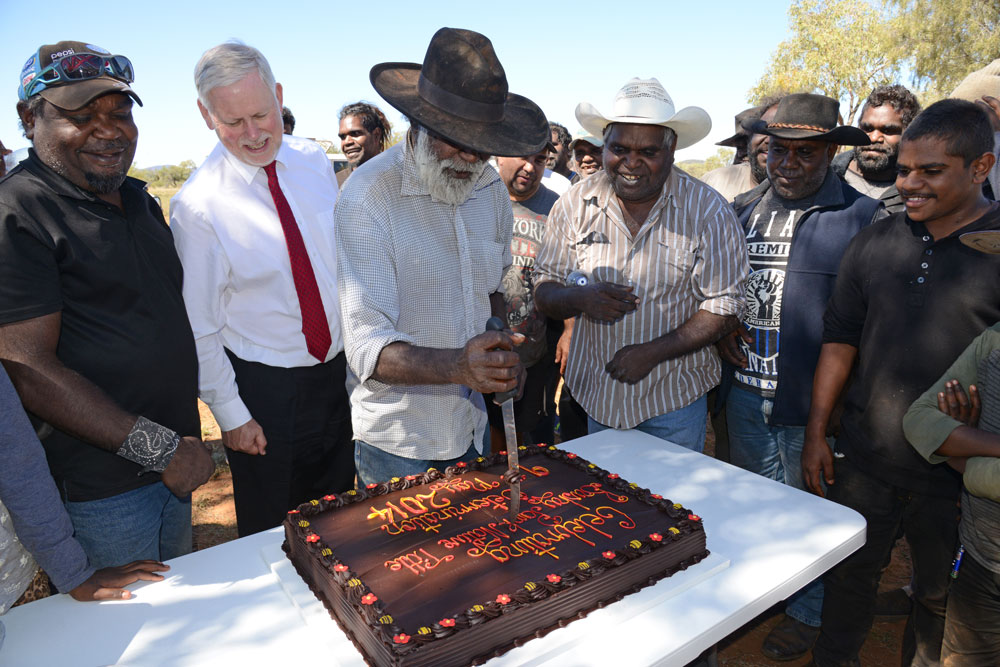
In a big week for native title holders in Central Australia the Federal Court this week recognised the native title rights of groups at both Kalkarindji and Bushy Park Station.
The Court sat in Kalkarindji – a keystone of the modern land rights movement – on Wednesday 7 May 2014 to hand down a determination of native title by consent over the Kalkarindji township in favour of the local Gurindji people and today the native title holders for Bushy Park Perpetual Pastoral Lease (PPL) gathered on the station at Edwards Creek, approximately 115 kilometres northeast of Alice Springs, for another sitting of the Court to recognise the native title rights of the Ilkewarn, Atwel/Alkwepetye and Ayampe people.
At the Kalkarindji hearing the Director of the CLC, David Ross, congratulated the traditional owners: “Standing with you here in your country, it is wonderful to see the long and proud tradition of Gurindji people is continuing, fighting for and achieving just recognition of your rights in traditional lands.” Mr Ross also noted that with the successful outcome of negotiations between the Northern Territory Government and traditional owners the development of Kalkarindji was well provided for.
In a speech following the court hearing at Kalkarindji Roslyn Frith, a senior traditional owner and director of the Gurinidji Aboriginal Corporation, the prescribed body corporate, also celebrated the persistence of the Gurindji people: “We hold the land in our hands and recognition here today is another milestone in the continuing campaign for Aboriginal land rights.”
Ms Frith also thanked the Federal Court and the Central Land Council and its staff for their assistance in lodging and pursuing the claim, together with the Northern Territory Government for its consent to the settlement.
The Bushy Park PPL Native Title determination application was filed with the Court on 13 December 2012 and Justice White presided over the Court to recognise the non-exclusive native title rights of the Ilkewarn, Atwel/Alkwepetye and Ayampe landholding groups.
The CLC Director passed on his congratulations to the Ilkewarn, Atwel/Alkwepetye and Ayampe native title holders and senior native title holder Eric Penangk attested to the recognition from the court:
“Ceremony and culture has to pass to the young people. Aboriginal law and whitefella law can work together.”
Bushy Park PPL is located in the east off the Plenty Highway and covers an area of 1695 square kilometres. The perpetual pastoral lease will continue to run as a pastoral lease.
The Federal Court will recognise the native title rights of groups from the Ngaliya Warlpiri people on 3 July 2013
The Federal Court will be sitting at 8 Mile Bore on Mt Doreen Station Perpetual Pastoral Lease (PPL), approximately 400 kilometres northwest of Alice Springs, to make a determination by consent of native title over Mt Doreen PPL.
Justice Reeves will preside over the Court to recognise the non-exclusive native title rights of the Jiri/Kuyukurlangu, Kumpu, Kunajarrayi, Mikanji, Pikilyi, Pirrpirrpakarnu, Wantungurru, Wapatali/Mawunji, Warlukurlangu, Yamaparnta, Yarripiri and Yarungkanyi/Murrku estate groups, who are part of the Ngaliya Warlpiri people.
The native title claimants’ country includes the area in which Mt Doreen Station is located.
The current owners, the Braitling family, will continue to operate Mt Doreen as a pastoral lease.
CLC Director David Ross congratulated the Ngaliya Warlpiri native title holders and paid tribute to claimants who have passed away during the application process.
An initial application was filed with the Court in 2005 after a mining company was granted an exploration licence over an area of significant cultural importance to the native title holders on Mt Doreen Station.
The native title holders were keen to protect these areas of high significance and instructed CLC to lodge a native title application over the area. This application was withdrawn on 11 October 2011 and a new native title application over the whole of the pastoral lease was filed with the Court on 14 October 2011.
On 2 July 2013 the Federal Court will be sitting at Laramba Community Living Area, approximately 210 kilometres northwest of Alice Springs, to make a determination by consent of native title over nearby Napperby Perpetual Pastoral Lease (PPL).
The Federal court will recognise the non-exclusive native title rights of the Anmatyerr and Arrernte people whose country includes the area where Napperby Station is located. Justice Reeves will preside over the court.
The current owners will continue to operate Napperby as a pastoral lease.
CLC Director David Ross congratulated the native title holders and paid tribute to the many claimants who have passed away while this process has taken place.
The original application was filed with the court in 2005 as a result of a mining company being granted an exploration licence over an area of important cultural significance to the Alherramp/Rrweltyapet, Ilewerr, Mamp/Arrwek, Tywerl, Arrangkey, Anentyerr/Anenkerr and Ntyerlkem/Urapentye estate groups on the station lease.
The native title holders were anxious to protect these areas of high significance and instructed CLC to lodge a native title application over the area.
This application was withdrawn on 17 March 2011 and a new native title application over the whole of the pastoral lease was filed with the court.
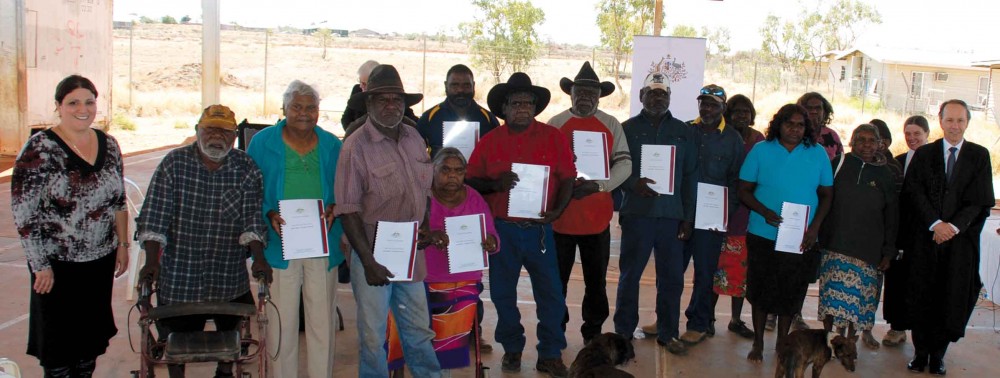
Native Title has been declared on two pastoral leases near the Queensland border.
On Wednesday 15 August the Federal Court of Australia sat at Alpurrurulam Community approximately 650 kilometres northeast of Alice Springs to recognise the rights and interests of native title holders of the Lake Nash and Georgina Downs pastoral leases.
The native title application was filed with the court in 2001 on behalf of the Ilperrelhelam, Malarrarr, Nwerrarr, Meyt, Itnwerrengayt and Ampwertety landholding groups.
The Court’s determination recognises their traditional rights, including the rights to access and hunt, gather and fish on the land and waters, the right to conduct cultural activities and ceremonies, the right to camp on the land, erect shelters and other structures, and it secures their right to negotiate over any future acts such as mining.
Lake Nash and Georgina Downs are run as pastoral stations and the claimants’ native title rights will co-exist with the rights of the pastoral leaseholders to graze cattle.
CLC Director David Ross congratulated the native title holders and paid tribute to the many claimants who passed away during the process.
After a long battle, Lake Nash (Alpurrurulam) became a Community Living Area in 1991 which meant a small area of land was excised from the station to enable the traditional owners to live there. Many of the current claimants or their parents were born and lived on Lake Nash Station near the waterhole for most of their lives.
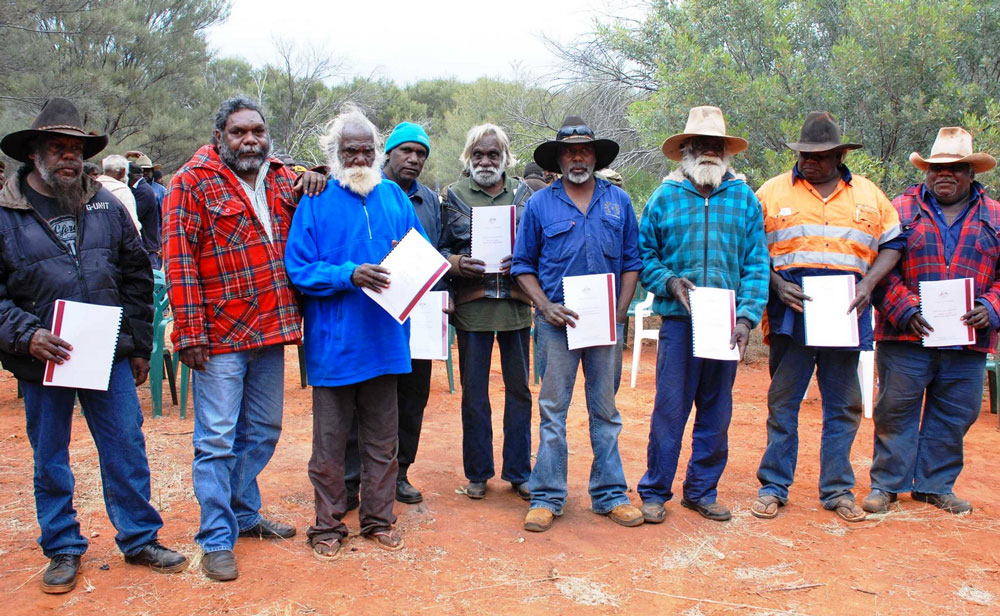
The traditional owners of the Neutral Junction area hope that the Federal Court’s decision to recognise their native title rights over their country will help them to protect a critical cluster of sacred sites.
In July 2011 the Federal Court visited Arnerre, an outstation within the Neutral Junction pastoral lease, 300 kilometres north of Alice Springs in the Northern Territory, to hand down its determination by consent of the parties recognising the native title rights of traditional owners .
The decision is an important step in the traditional owners’ longstanding battle to protect their country and will ensure their ability to negotiate over future uses of the land, particularly over any mining activity.
As is normally the case in the Northern Territory, the recognition of native title provides few additional rights to traditional owners other than those already provided for under the Pastoral Lands Act, including the right of access, hunting, and the right to reside and build shelters.
But at Neutral Junction, where a known gold reserve exists in the same area as a critically important complex of sacred sites, it was the threat of mining that prompted traditional owners to seek recognition of their native title rights, and to ensure their right to negotiate over any future exploration and mining.
Traditional owners have historically resisted any exploration in this region, and any form of ground disturbance has caused a high level of anxiety to senior people.
In the early 1990s the Central Land Council asked the Northern Territory minister responsible for mines to declare a Reservation from Occupancy under the Mining Act over a portion of the Crawford and Osborne Ranges in order to protect sacred sites. Unfortunately the minister refused.
For some years the area has been protected by agreements between the CLC and exploration and mining companies not to interfere with the sites, and the traditional owners hope that recognition of their native title rights will strengthen this protection in future.
The application area comprises 1664 square kilometres of the northwestern section of the Neutral Junction Pastoral Lease and includes the parallel Crawford and Osborne Ranges, the floodout of the Taylor Creek and flat spinifex plains.
The estate is located centrally within the territory of the Kaytetye people, who have maintained their customs and laws remarkably well considering the changes that have been brought since their first encounter with Europeans 149 years ago, when John McDouall Stuart camped at Taylor Creek in 1862.
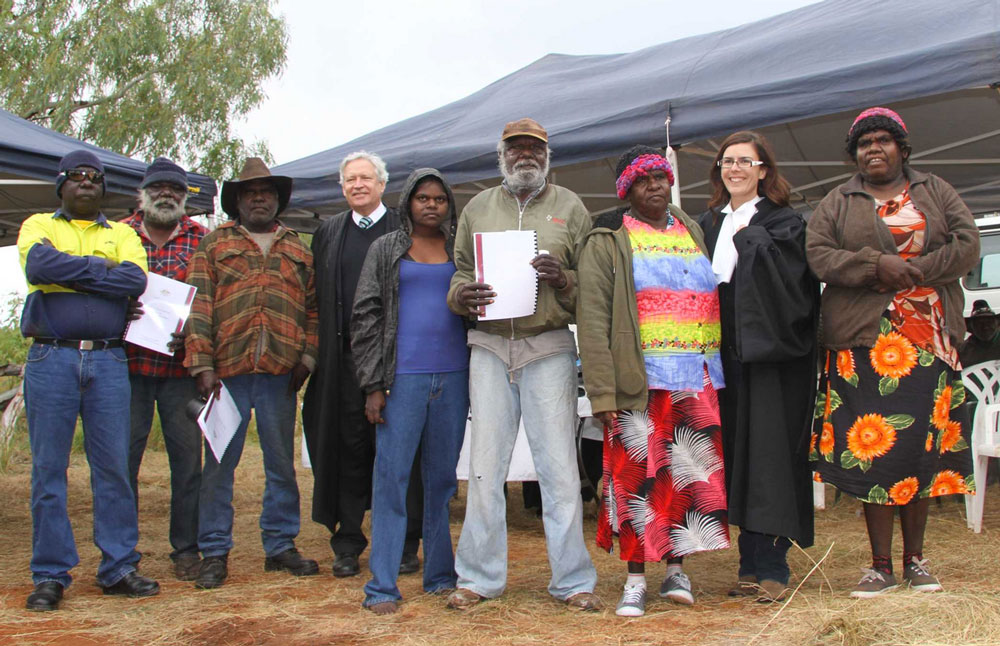
In July 2011, the Federal Court of Australia visited Injaridjin Waterhole on the Davenport Range National Park, roughly 400 kilometres north of Alice Springs, to recognise the native title rights of the traditional owners of the Kurundi pastoral lease.
The court handed down its native title consent determination recognising the non-exclusive native title rights of the claimants over the 3857 square kilometres held under the Kurundi Perpetual Pastoral Lease (PPL).
The decision is the outcome of a native title claim made on behalf of the Mirtartu, Warupunju, Arrawajin and Tijampara landholding groups.
The court’s determination recognises their traditional rights, including the right to hunt, gather and fish on the land and waters, the right to conduct cultural activities and ceremonies, the right to live on the land, and for that purpose, to camp, erect shelters and other structures, and it secures their right to negotiate over any future acts such as mining.
The native title claimants have maintained their strong connection to their country on the Kurundi pastoral lease in sometimes difficult circumstances.
Many of the claimants and their ancestors have lived and worked at the station over many decades. Working as stockmen gave them an opportunity to stay on their country, learn all their stories and abide by their law.
Claimant Pilot Carr was born on the end of the Kurundi airstrip and lived and worked as a stockman on Kurundi Station most of his life. Another, Pat Murphy, was born on the station, and his father, Murphy Jappanangka, worked as a stockman there, later taking part in the Kurundi walk-off for equal wages in 1977.
The claimants hope that the determination will help them to continue to protect their country and sacred sites on Kurundi Station into the future.
The Kurundi PPL continues to be run as a cattle station, and the native title rights recognised by the Federal Court will co-exist with the pastoral lease.
The Native Title Determination Application over Kurundi pastoral lease was originally filed on 28 February 2001 in response to the desire of traditional owners to better protect sacred sites and to safeguard their rights.
There have been a number of successful land claims bordering Kurundi PPL resulting in the grant of Aboriginal land. Bordering Kurundi PPL on the south is Anurrete Aboriginal Land Trust (ALT) and Erlterlapentye ALT (Davenport Range National Park), and on the western border are Mungkarta and Warumungu ALTs. On the southwest border lies Singleton PPL and on the east is Epenarra PPL.
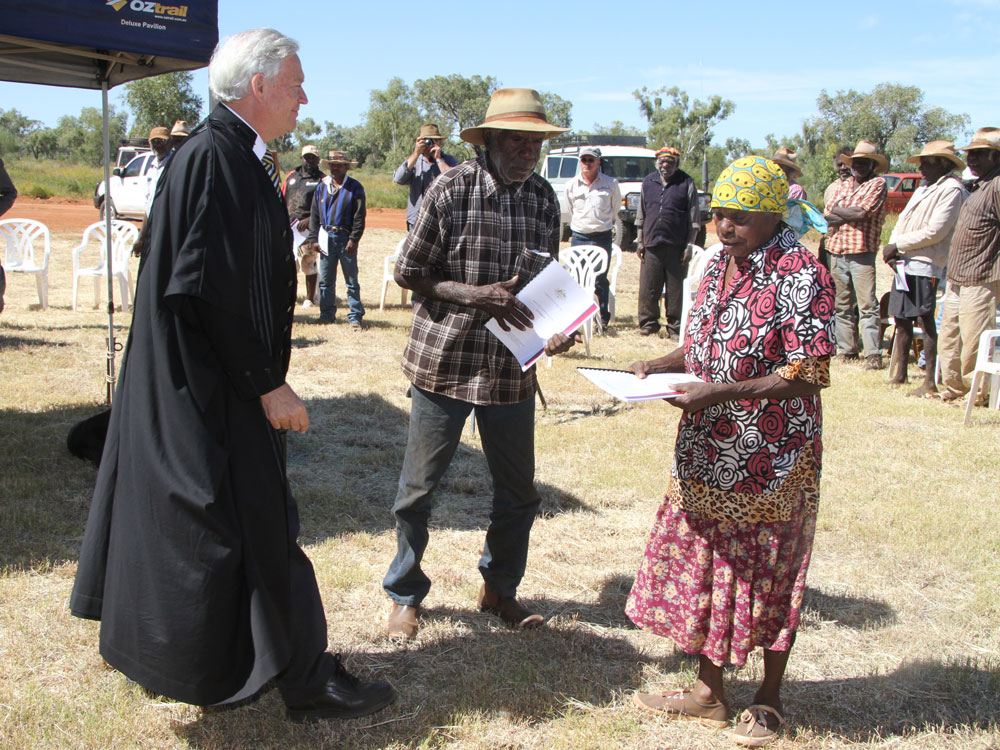
A native title consent determination for exclusive possession of Ooratippra pastoral lease was handed down by Justice Reeves at a special sitting of the Federal Court at Ooratippra on 5 May 2011.
Ooratippra pastoral lease is situated 300 kilometres northwest of Alice Springs on the Sandover Highway. It covers 4292 square kilometres and is owned by the Ooratippra Aboriginal Corporation.
The Indigenous Land and Sea Corporation (ILSC) purchased Ooratippra Station PPL in May 1999 after years of lobbying by native title holders who wanted title and the ability to run their own cattle business on their own land.
Title was transferred to the Ooratippra Aboriginal Corporation in October 2000.
In 2001, the CLC lodged the Ooratippra native title application on behalf of the Irrkwal, Irrmarn, Ntewerrek, Aharreng, Arrty/Amatyerr and Areyn estate groups of the Alyawarr language group.
The application covered the whole of the station, which includes the Irretety Community Living Area held by the Irretety Aboriginal Corporation.
As Ooratippra Station PPL and Irretety CLA are owned by native title holders, they were able to claim exclusive possession under the Native Title Act. The native title determination secures their traditional rights and, in particular, their right to exclusive possession of the land, as well as the right to negotiate over any future acts like mining.
Ooratippra can run up to 4000 head of cattle and will continue to be leased out to a neighbouring landowner who will, over time, assist in the re-establishment of a locally managed cattle herd.
Any future work will now be directed towards the setting up of the a prescribed body corporate.
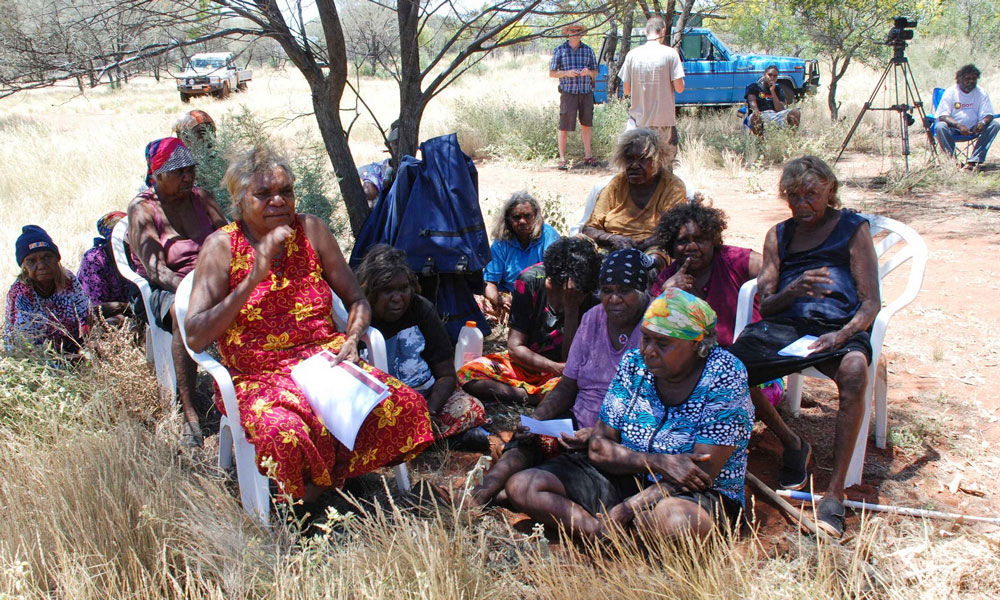
The first native title consent determination between traditional owners and a non-government conservation organisation was handed down by Justice Reeves at a special sitting of the Federal Court at the Newhaven Wildlife Sanctuary on 8 December 2010.
The determination was an excellent example of how leaseholders and native title holders can work together for the benefit of all involved.
Newhaven Station covers an area of more than 2600 square kilometres northeast of Alice Springs and is one of the largest non-government conservation areas in the world. It is a hotspot for threatened species such as black-footed rock wallabies, brush tailed mulgara and great desert skinks. One of the few recent sightings of the endangered night parrot was also recorded on Newhaven.
Birds Australia initially acquired the pastoral lease for conservation with support from the Australian Government’s National Reserve System program before transferring the lease under a partnership with Australian Wildlife Conservancy (AWC).
The consent determination is important because it recognises that Aboriginal laws and customs still hold a place of importance in today’s society. It also further strengthens the working relationship between AWC and the Warlpiri-Luritja traditional owners that has built up over the past five years cooperating on fire management and biological survey projects on the property.
The traditional owners and AWC now look forward to a continuing partnership that draws on a combination of science and traditional knowledge to secure the extraordinary conservation values of Newhaven and help achieve the socio-economic aspiration of traditional owners.
Any future work will now be directed towards the setting up of a prescribed body corporate.
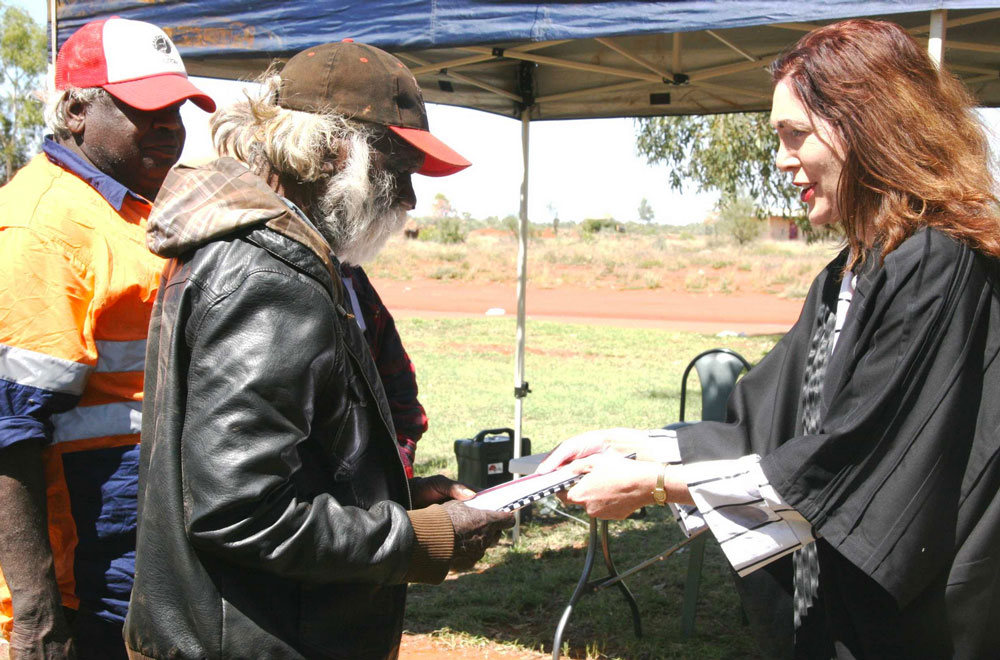
The determination of native title over the entire Singleton Pastoral Lease was handed down by Justice Collier at a special sitting of the Federal Court at Alekerange on 7 September 2010.
The determination area covers an area of nearly 3000 square kilometres on Singleton, which is north of Alekerange and south of Tennant Creek.
The determination by consent is between the parties, the applicants and respondents, the NT Government and NT Gas.
The parties have agreed that non-exclusive native title exists on Singleton in favour of the applicants and provides for native title holders to access the property for traditional activities such as hunting and ceremony.
It also allows native title holders to be considered if a third party plans any development on the determination area.
Any future work will now be directed towards setting up a prescribed body corporate.
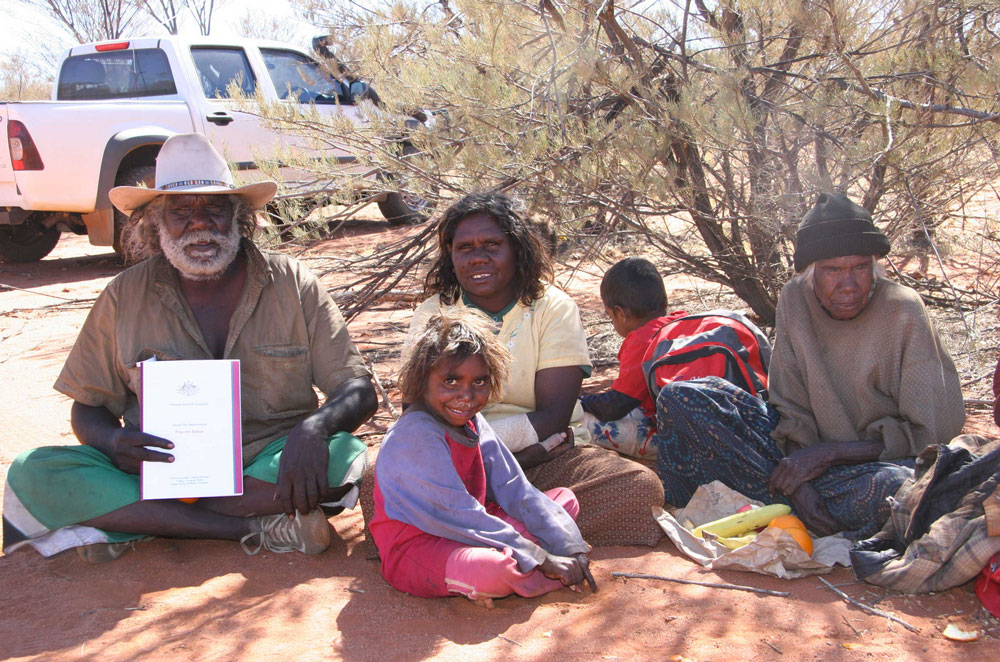
Anmatyerr people had their native title rights and interests over Pine Hill Station, southeast of Ti Tree, formally recognised by the Federal Court of Australia at a ceremony at Desert Bore on August 9, 2009.
The court handed down a consent determination to native title applicants Lindsay Bird Ampetyane and and others on behalf of the Ilkewartn and the Ywel (pronounced IL-COW-WART-NA and YULA ) estate groups of the Anmatyerr people.
A consent determination means that all parties have agreed that native title rights and interests do exist over a particular area.
The Central Land Council lodged the native title application in 1999.
CLC Director David Ross said he was always pleased when land issues were resolved without costly court actions.
“I am extremely pleased for the traditional owners and congratulate them on this outcome which protects their rights into the future,” Mr Ross said.
“It guarantees them a seat at the table in an area known for its horticultural development and extremely significant in the economic development of Central Australia,” he said.
Mr Ross also paid tribute to the contribution and dedication of the senior traditional owners some of which were involved in the application from its inception.
The Ilkewartn group mainly live in the communities of Mulga Bore, Wilora and Alice Springs. Senior Ilkewartn traditional owner, Lindsay Bird, who now lives at Mulga Bore, grew up on the neighbouring Bushy Park Station walked all over his country on Pine Hill with his family collecting bush tucker and learning about his sites and law.
Traditional owners Dorothy Ampetyane, Bunny Ampetyane and Rosemary Ampetyane lived traditional lives at Desert Bore and also grazed sheep and goats.
The Ywel group live at Ti Tree, Aileron and Laramba.
Traditional owner Archie Glenn’s father and mother worked at both Aileron and Pine Hill stations and the family visited their sacred sites on Pine Hill on the weekends.
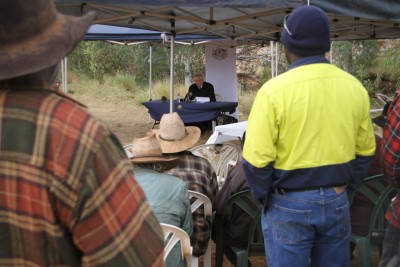
One of the most significant sacred sites for Warumungu, Kaytetye, Warlpiri and Alyawarr people in the Tennant Creek region is being handed back to its traditional owners, 28 years after they first made their claim for title to it.
The Minister for Families, Housing, Community Services and Indigenous Affairs, Jenny Macklin will hand title to traditional owners of Karlu Karlu (The Devils Marbles) at a ceremony at the site, 100 km south of Tennant Creek today (Tuesday 28 October 2008).
The Minister will also hand back title to the Alyawarr, Kaytetye, Warumungu and Wakaya traditional owners of the Davenport Range National Park The Ayleparrarntenhe Aboriginal Land Trust will hold title to 17.75 square kilometers of land at Karlu Karlu and the Erlterlapentye Aboriginal Land Trust will hold title to 1119 square kilometers of the proposed Davenport Murchison Range National Park . The neighbouring Anurrete Aboriginal Land Trust will also lease 156 square kilometers of its land to the national park.
CLC Director David Ross said the hand backs will be an emotional event for the traditional owners of the land.
“In the case of Karlu Karlu, these people have fought for years to protect this place against developments which would have seen road detours and a railway line cut through the site,” he said.
“Many people have passed away: one custodian lost all of his brothers over the years but continued to fight for their site.
“Similarly the proposed Davenport Range National Park has had a painful past, especially in its establishment when sites were bulldozed and desecrated and traditional owners completely disregarded during the clearing of the park boundaries.
“I congratulate all of them for their courage, persistence and resilience – it’s been a tough, and often a very sad road for all of them and I sincerely hope that these hand backs will provide a sense of peace and relief. I also look forward to the joint management arrangements that follow giving them the level of recognition and involvement in the management of these areas that they deserve for many years to come, ” Mr Ross said.
The hand backs will benefit about 300 Aboriginal people from surrounding communities. The parks are being handed back as a result of settlement of long standing land claims over some national parks under the Parks and Reserves (Framework for the Future) Act. The Land Trusts will immediately sign 99 year leases with the Northern Territory Government which will allow these parks to continue as national parks with public access under joint management arrangements.
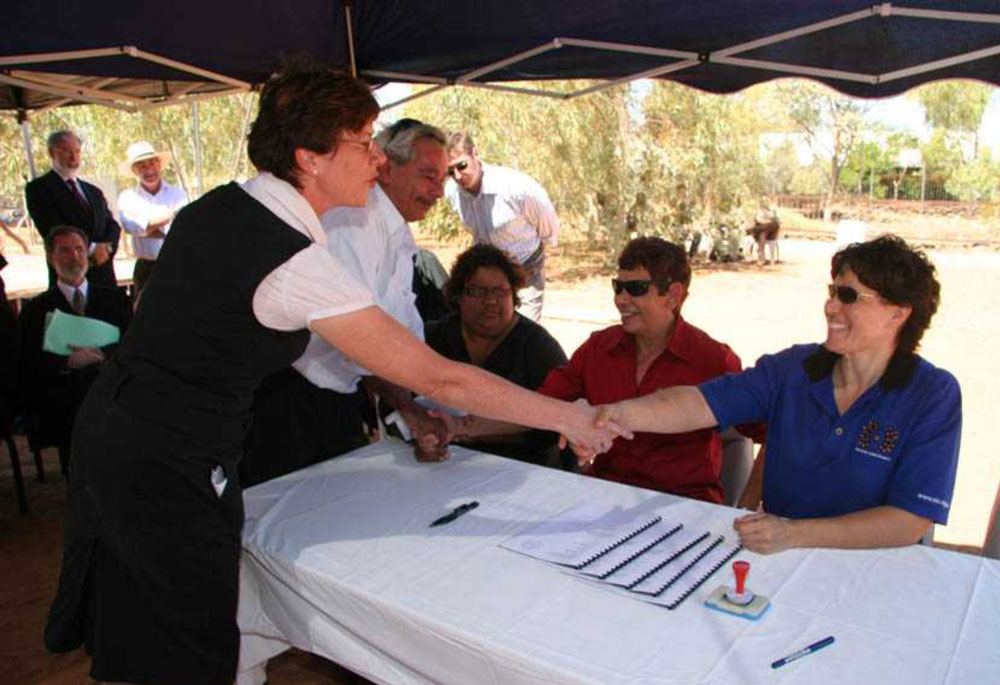
In September 2007 Tennant Creek became the first town in Australia to have a native title determination made by consent rather than litigation.
Justice Mansfield of the Federal Court handed down his determination at a special sitting of the court in Tennant Creek and an Indigenous Land Use Agreement (ILUA) was signed immediately after the Federal Court’s determination.
The ILUA between the Northern Territory Government and the native title holders allows for native title recognition as well as extinguishment and compensation over some areas and enables native title issues to be dealt with over the entire town. It will benefit some 200 Warumungu native title holders from the Patta estate group.
CLC Director David Ross congratulated the native title holders and the Northern Territory Government for their common sense in coming to an agreement.
“There have been no lengthy and costly court battles and a consent determination and an ILUA forged with goodwill is the best outcome anyone could expect from the native title process,” Mr Ross said.
“The ILUA recognises that past acts may have extinguished native title and allows large areas of the town to develop without any further negotiation – there are 100 residential and 60 industrial allotments which have been dealt with by agreement,” he said.
“In return, the Patta Aboriginal people finally get Aboriginal freehold title to certain land, including Kunjarra or the Devils Pebbles which is an extremely significant site to them.
“While they already have NT freehold title, they want the area scheduled as Aboriginal land to protect it against mining activity which has caused such immense damage and distress to the custodians in the past.
“The native title holders have agreed to enter good-faith negotiations regarding the management arrangements for Kunjarra and they have guaranteed that visitors will continue to enjoy free access to the area,” he said.
“Compensation for native title holders will also give them an educational trust fund for the benefit of Aboriginal school students in the town, some residential and industrial blocks in Tennant Creek and support for the prescribed body corporate – the Patta Aboriginal Corporation – which will act on behalf of the native title holders in the future,“ Mr Ross said.
Mr Ross paid tribute to the many claimants who passed away during the process.
“Many of them fought in the Warumungu Land Claim and went on to fight for justice within the township. They spent a good part of their lives battling so that the young people of Tennant Creek today can enjoy a better future,” Mr Ross said.
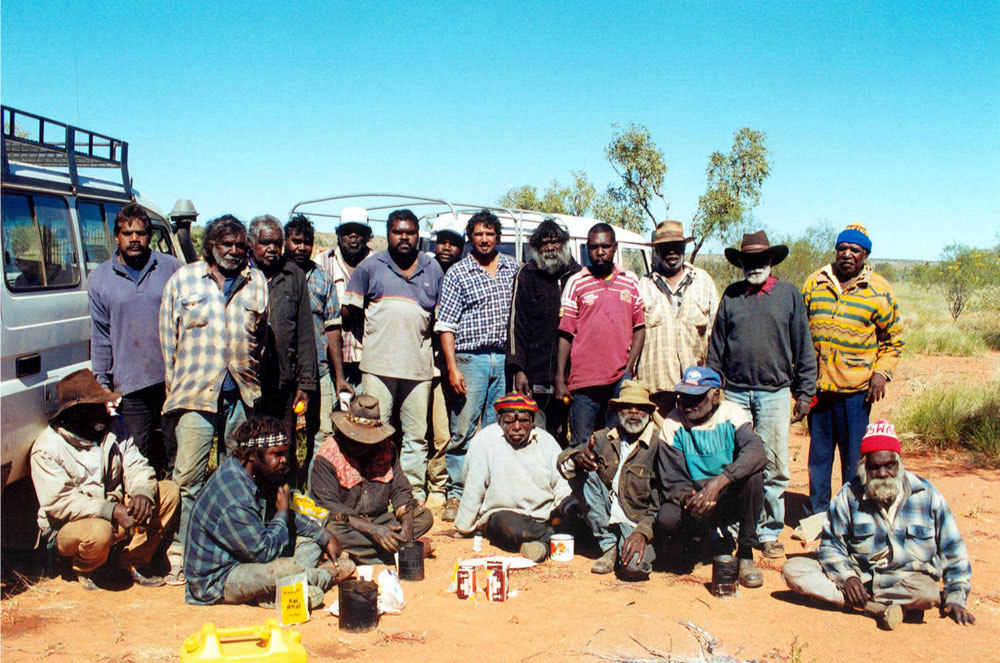
Central Land Council director David Ross today welcomed the Full Federal Court decision which upholds native title rights for the Alyawarr, Kaytetye, Warumungu and Wakay people near Tennant Creek.
“The Federal Court has substantially upheld Justice Mansfield’s original decision. Importantly, native title holders around Australia have won the right to live on and protect sacred sites on pastoral land,” said Mr Ross.
“While it is mainly a technical legal decision, it reinforces the initial victory for the native title holders who lodged their application 10 years ago to ensure their native title rights and interests were protected in the Davenport Murchison Ranges.
“The decision means strong rights in country will continue to be recognised and native title holders can continue their role in negotiating joint management of the national park.”
“The Davenport Murchison native title holders can be rightfully proud that recognition of the ceremonies and ground paintings they shared with Justice Mansfield to show strong connection to country has not been diminished. It is just a shame that 10 years have passed since the original application and a number of the key witnesses have now passed away,” said Mr Ross.
The Central Land Council lodged a native title application on behalf of native title holders in 1995 over land south-east of Tennant Creek, including the proposed Davenport Murchison National Park and the historic township of Hatches Creek.
The application was heard by Justice Mansfield “on-country” in September 2000 and his decision was handed down in 2004. The Northern Territory Government subsequently appealed on 55 separate grounds which were heard by the Full Court of the Federal Court in Darwin in November 2004.
As a result of the Full Federal Court decision, the native title holders keep rights to hunt and live on the land and continue to practice cultural and ceremonial activities.
